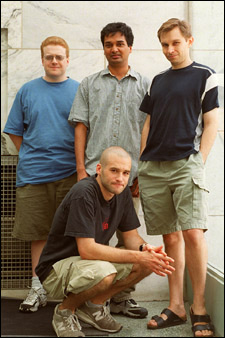Wine molecule slows aging process:
Scientists drink to that

A molecule that is an active ingredient in red wine can slow the aging of human cells. It extends the life expectancy of every organism that, so far, has been fed on it, including yeast, worms, and fruit flies.
Called resveratrol, the wonder substance seems to work in the same way as does drastic calorie cutting. Dramatic reduction of calories has been shown to increase the life span of mice, rats, and monkeys. Such diets are being tried in humans but results are not yet in. Severe dieting also cuts the risk of dying from cancer, heart problems, and other age-related diseases in monkeys.
If resveratrol and related molecules are found to work as well in humans, we could gain extra years of healthy life without starving for them. We could have our cake and eat it, too.
“The discovery brings closer a time when a drug that extends life and prevents many diseases of aging becomes a reality,” says David Sinclair who leads the research at Harvard Medical School. “I’m not a doctor so I can’t speculate on how much wine to drink, but I’ve increased my consumption since we made the discovery.”
Physicians recommend a glass or two of red wine a day as part of a heart-healthy diet. No one would advise nondrinkers to starting gulping red wine until better information about its anti-aging effect becomes available.
Eureka moment
Sinclair, 34, and his colleagues have been working on a marvelous protein called SIR2, which allows yeast cells to survive a startling 70 percent longer than normal. The same kind of metabolic trick in humans would extend our average life span to about 136 years. Humans are far more complex than yeast, but they have a similar protein, called SIRT1. All animals, in fact, boast copies of SIRT1, which Sinclair and others believe mimes the function of yeast SIR2.
With the help of Konrad Howitz and other colleagues from BIOMOL Research Laboratories in Plymouth Meeting, Penn., the Harvard researchers screened libraries of molecules for those that would activate SIRT1. They found 17 of them, most of which come from plants. When they fed them to human cells, they were overjoyed to discover that resveratrol extended the cells’ survival by turning on SIRT1.
The next step – Sinclair calls it working backward – was to confirm the finding in yeast cells. He admits to “being skeptical that resveratrol would extend their life span.”
One of the lab assistants set up two Petri dishes where yeast cells could grow, one with resveratrol and one without. Sinclair did not know which was which while he worked on them. “I soon saw some of the cells living much, much longer than the others,” Sinclair relates. “I didn’t know if those were the ones that had the molecule. The uncertainty was killing me, so I sneaked into the lab and looked at the hidden labels. Lo and behold! The cells that were living longer were those on reservatrol. That was my ‘Eureka!’ moment, the highlight of my career.”
Cancer prevention
Sinclair and his team have begun testing improved varieties of resveratrol and its sister molecules in human cells. If things continue to go well, they will try them in rodents, then eventually in humans.
Molecules like resveratrol regulate other proteins, most of which still need to be identified. One of the known proteins, called p53, interferes with the natural process of cell death. Others are believed to be involved in repairing damage to DNA, the stuff of genes.
“We suspect that p53 is just the tip of the iceberg, that lots of other defenses are activated by these molecules through interactions with SIR2 and SIRT1,” Sinclair explains. “These interactions keep cells alive longer and buy more time for their DNA damage to be repaired.”
Changes in gene structure as people age can lead to cancer and diseases of the heart and blood vessels. Activation of defenses against these mutations may be the reason why animals fed resveratrol-type molecules live longer. Other researchers have found evidence that resveratrol can prevent cancer in mice, and Sinclair’s group plans to check that out.
This family of molecules is produced by plants in response to mild stress, such as not enough water. “The final piece of the puzzle,” notes Sinclair, “is that reducing calories provides the same type of stress.”
This activation of molecular defenses is not unlike a vaccine. Vaccinations introduce bits of viruses or bacteria into the body, not enough to cause a disease but enough to prod your immune system into building defenses against it.
There are still many questions to be answered about how anti-aging molecules and severe calorie restriction work to extend life. Then there’s the bigger question of whether they will work in humans. If the molecules allow us to live a longer, healthier life, producing them should be relatively easy and inexpensive. They could be purified from plants or made artificially in large amounts.
“Before that happens, many problems need to be solved,” Sinclair admits. “And we will celebrate each new solution with a glass of red wine.”




